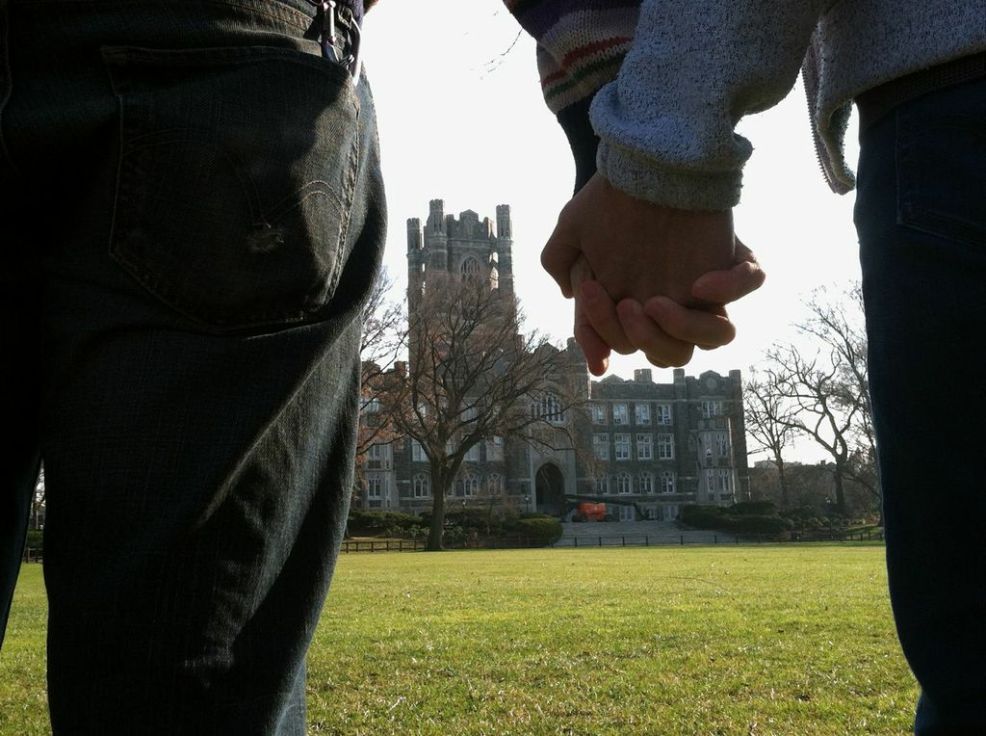
LGBTQ students remain inhibited in publicly displaying affection to their partners, since they frequently encounter homophobia in the Bronx community. (Photo courtesy of Tom Nicholas)
By JEFFREY COLTIN
Every August, thousands of young people come to Rose Hill and take up residence in the Bronx — and a lot of them are gay. These students and all lesbian, gay, bisexual, transgender and queer (LGBTQ) students in many ways face a different experience at Rose Hill than those students who are not sexual or gender minorities — especially off-campus.
“There’s this sense — even if it’s not true, and it is true, I think — but there’s this sense that makes me more of a target,” Jeff Lockhart, FCRH ’13, GSAS ’14 said.
Lockhart identifies as queer and has openly dated males during his time at Rose Hill. He has given a lot of thought to LGBTQ issues at Fordham as the principal investigator of the Fordham Que(e)ry, a report published this year on the LGBTQ student experience.
“I tend to think of myself as one of the most comfortably ‘out’ people here,” Lockhart said, but even he does not always feel comfortable off campus. He notes he has gotten more confident since he shaved off his pink and purple mohawk hairstyle.
“When I was so visibly queer, there was the concern that that would be taken for a weakness,” Lockhart said. “You know, if you’re going to pick someone to mug, you might as well pick someone who looks weak, or someone who isn’t going to fight back, or ‘sissy guy.’”
Every Rose Hill student knows walking off campus has its potential dangers. Walking down the wrong street at the wrong time can result in getting mugged or threatened. If you’re female, walking down almost any street at any time can result in getting catcalled and harassed.
“The safety of an area, or its lack of safety, is sort of magnified for people who present in gender-non-conforming ways or in feminine ways,” Lockhart said. “Because, if there’s going to be violence or aggression, it’s probably going to happen to someone who’s perceived as weaker.”
For LGBTQ students, it’s not just the neighborhood around the university that’s an issue. It’s the whole borough. Of all corners of New York City, the Bronx is considered to be the least friendly to LGBTQ people. It has no full-time gay bar and few services or community centers. Many LGBTQ Bronx residents mention a very real sense of homophobia.
“I don’t think I would ever walk around the Bronx holding hands with another guy or doing anything else romantic with another guy,” said one gay male Fordham student who preferred to remain nameless. He mentioned walking home with friends late one night from the D train and being called “a group of faggots” by an intoxicated man.
Rachel Dougherty, FCRH ’15 identifies as a queer woman. She has had similarly unnerving experiences walking with her girlfriend in the Bronx.
“We’ve had people say we’re disgusting; we’ve had men catcall both of us (much more aggressively then when I’m by myself); we’ve been subjected to people’s stares,” she said. “Sometimes I just want to hold my girlfriend’s hand without comment.”
It’s not all bad in the Bronx. “No matter where you are, there’s always a gay community,” says Jesus Leon, FCRH ’15, who came out as gay while at Fordham.
Leon says the community just is not very vocal. He attributes it to the borough’s ethnic makeup. “Being Hispanic myself, I know it’s not a very accepted thing among Hispanics,” Leon said.
That makes Ritchie Torres’ win even more impressive. Torres is openly gay and was just elected to the New York City Council for the 15th district, which includes both Fordham and the Belmont neighborhood where many Rose Hill students live. That makes him the first openly gay official elected to a major office in the Bronx — 22 years after the first openly-gay city council members were elected in Manhattan.
Manhattan’s proximity is seen as a boost in a sometimes hostile Bronx. One gay student noted that, “Hell’s Kitchen is only one ride away on the Ram Van, and it doesn’t get much gayer than that.”
Other LGBTQ students see campus itself as a refuge. Leon said that on campus, “I feel completely comfortable [holding my boyfriend’s hand], and I think that’s one of the reasons why I came out in the first place.”
Another gay student agreed. “I’ve never felt the need to hide my sexuality at Fordham… I am who I am, and everyone at school accepts it.”
But campus is not always a comfortable environment either. Dougherty notes getting “unsettling” looks from passersby, and a gay student relates a story of his lesbian friend walking past a group of Fordham students while they chanted gay slurs at her.
Fordham Security did not respond to a request for information on bias incidents on and off campus, but Lockhart’s Que(e)ry found that half of LGBTQ undergraduates responding had witnessed harassment on campus, most of them multiple times. A significant minority of responding students had either witnessed or experienced threats of violence related to LGBTQ identity. These incidents happened both on and off campus.
Lockhart says it is important that Fordham allows all students to feel comfortable.
“Statistically, the majority of [LGBTQ students] showing up on Fordham’s front gate have never had an opportunity to be welcomed and accepted before,” Lockhart said. “So it’s a real big chance that Fordham has, and we shouldn’t blow it.”
